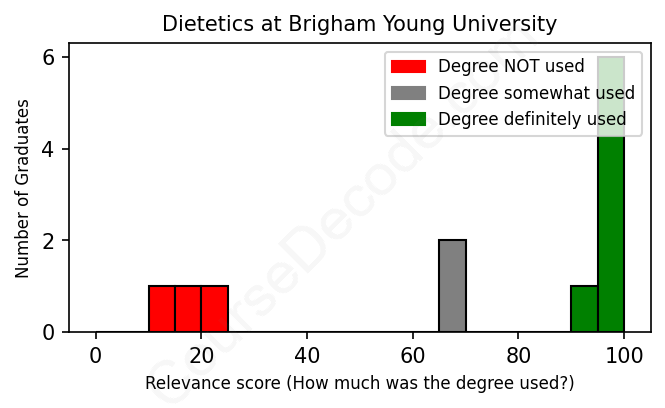
First, some facts. Of the Dietetics graduates from Brigham Young University we've analyzed , here's how many have used (or NOT used) their degree in their career:

These are estimates based on AI analysis of 12 LinkedIn profiles (see below).
The verdict? Above average. Overall, with an average relevance score of 73%, Dietetics graduates from Brigham Young University have a higher likelihood (+6%) of finding work in this field compared to the average graduate across all fields:
And for comparison, here's the chart for all profiles we've looked at across all degrees.
Also, after graduating, 50% of these graduates have pursued further education other than another Bachelor's degree (such as a Masters degree or other), compared to the average across all profiles of 35%. This suggests you may need more than just a Bachelors degree to be competitive as a Dietetics graduate.
See the details:
|
Relevance score: 100% We think this person has gone into a career highly relevant to their degree. We think this person has gone into a career highly relevant to their degree.
DEGREE INFOGraduated in 2013 from Brigham Young University with a Bachelor's Degree in Dietetics. No other secondary education since. JOB HISTORY SINCE GRADUATIONDietetic Intern Baylor University Medical Center Aug 2013 - May 2014 PRN Dietitian  ARAMARK Healthcare May 2014 - Present ABOUTNo information provided. |
The top 10 most common jobs done by the graduates we've analyzed (ranked most common to least) are:
After analyzing the LinkedIn profiles of folks who graduated with a Dietetics degree from Brigham Young University, it seems that the most common job types are related to clinical roles like Dietitian positions. Many graduates have taken on roles such as Clinical Dietitians and Registered Dietitian Nutritionists, which directly apply their education in nutrition and dietetics. These jobs require them to use their knowledge daily, making them highly relevant to their degree. A few also worked as Dietetic Interns, which is a great way to gain practical experience in the field.
However, it's worth noting that not all graduates went into roles that align closely with their degree. Some have taken jobs in completely different fields, like Occupational Therapy or sales roles, which don't really utilize the dietetic principles they learned. So while a good number of these professionals are definitely working in nutrition-related areas, there’s a notable percentage who ventured off into unrelated sectors, potentially making it a mixed bag when considering the overall relevance of their positions to the Dietetics major. Overall, if you’re thinking of pursuing Dietetics, it seems like there are solid opportunities mostly focused on clinical nutrition, but be prepared that not everyone sticks to that path.
Here is a visual representation of the most common words in job titles for Dietetics graduates (this is across all Dietetics graduates we've analyzed, not just those who went to Brigham Young University):

Graduates from the Dietetics program at Brigham Young University generally have a solid start in related careers right after they complete their degrees. Many of them pursue internships, like dietetic internships, which is a common first step toward becoming a registered dietitian. For instance, those who graduated around 2013 to 2021 mostly landed roles as clinical dietitians or in various dietetic positions, indicating that they're sticking close to their field of study. Occasionally, you'll see them branch out into related areas or even other health professions, like occupational therapy. However, most tend to stay within the nutrition and dietetics realm, which is a good sign for the program's relevance to practical careers.
Fast forward five to ten years, and it seems many of these graduates continue to thrive in healthcare and related fields. Most are either working as registered dietitians or moving into hybrid roles that include dietetics as part of their job description. Some graduates have taken on leadership or managerial positions, showcasing their career progression. Yet, there are a few who have ventured into seemingly unrelated fields, like sales or part-time roles. This could be a sign that some aren't fully utilizing their dietetic background, or they might just be exploring different avenues away from their primary studies. Overall, though, the majority of BYU Dietetics graduates appear to be doing well in careers that align with their educational background, which is certainly encouraging for anyone considering this path!
Honestly, a Bachelor’s degree in Dietetics can be pretty challenging, and the program at Brigham Young University is no exception. You'll be diving into subjects like nutrition science, food systems, and clinical dietetics, which require a good amount of studying and understanding complex concepts. Plus, there are lab components where you get to apply what you've learned, and that can be a bit intense too. It's definitely not a walk in the park, but if you're passionate about food and nutrition, it can be really rewarding. Just be ready to put in some effort, and if you enjoy the material, it won't feel unbearable!
Most commonly, in the LinkedIn profiles we've looked at, it takes people 4 years to finish a Bachelor degree in Dietetics.
So, looking at the profiles of these BYU dietetics grads, it’s a mixed bag regarding how much they’re making. Some of the earlier graduates, like those who have taken on roles as registered dietitians and occupational therapists, are likely raking in decent salaries since those positions generally pay well, especially with experience. However, others like the recent grads still in intern or entry-level roles might not be making as much yet but are on the path to better pay as they gain experience. Overall, while some of these folks probably land pretty good gigs that allow them to make decent money, others are still climbing that salary ladder, and it might take a little time before they see the bigger bucks.
Here is a visual representation of the most common words seen in the "about" section of LinkedIn profiles who have a Bachelor degree in Dietetics (this is across all Dietetics graduates we've analyzed, not just those who went to Brigham Young University). This may or may not be useful:

Here are all colleges offering a Bachelor degree in Dietetics (ordered by the average relevance score of their Dietetics graduates, best to worst) where we have analyzed at least 10 of their graduates:
| College | Score | Count |
|---|---|---|
 University of Delaware University of Delaware
|
87 | 13 |
 Purdue University Purdue University
|
79 | 10 |
 University of Kentucky University of Kentucky
|
76 | 10 |
 Michigan State University Michigan State University
|
74 | 16 |
 Brigham Young University Brigham Young University
|
73 | 12 |
 Iowa State University Iowa State University
|
72 | 13 |
 Florida State University Florida State University
|
67 | 11 |
 Arizona State University Arizona State University
|
65 | 12 |